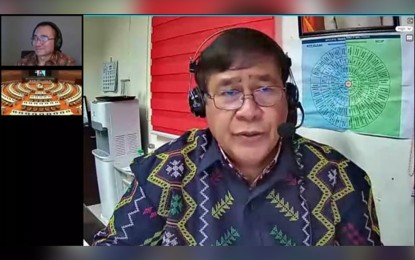
Secretary Allen A. Capuyan, National Commission on Indigenous Peoples (NCIP) Chairperson, cautions the international community to validate claims and appeals of some interest groups, using the pandemic situation, to solicit funds for IP communities in the Philippines. Speaking during the virtual 13th Session of the UN Expert Mechanism on the Rights of Indigenous Peoples on Dec. 2, Capuyan said these donations are being channeled to support terrorist activities. (Contributed photo)
GENEVA, Switzerland – The Philippines on Wednesday stressed the need for indigenous peoples (IPs) to be meaningfully engaged in discussions and decisions on all matters affecting them.
"IP representations in decision making bodies such as the Regional Development, Peace and Order and Health Councils ensured that Covid-19 responses for IP communities in the Philippines were shaped by the IPs themselves,” said National Commission on Indigenous Peoples (NCIP) Chairperson, Secretary Allen A. Capuyan, during the 13th Session of the UN Expert Mechanism on the Rights of Indigenous Peoples (EMRIP) convened virtually here on Dec. 2.
Capuyan said the meeting responses have effectively helped IP communities manage health risks and prevent the spread of Covid. These included interventions such as the immediate imposition of the quarantine, the prioritization of IPs in health and social services, and the funding support for IP farmers for food production requirements to assist communities to secure food supply amidst market disruptions arising from the widespread implementation of quarantine across the country.
The UN EMRIP was established by the Human Rights Council, the UN's main human rights body, in 2007 to assist Member States in achieving the goals of the UN Declaration on the Rights of Indigenous Peoples.
The 13th Session of EMRIP consisted of virtual regional meetings from 30 November to 4 December 2020 under the theme of the impact of COVID-19 on the rights of indigenous peoples.
Capuyan drew the EMRIP's attention to the continuous attacks by the armed non-state actor and terrorist organization Communist Party of the Philippines-New People's Army-National Democratic Front (CPP-NPA-NDF) against the IPs in the Philippines, as well the disinformation being perpetrated by this group on the state of IP communities in the country to advance its violent political agenda.
IP communities, he said, have witnessed "reprisal killings of many IP leaders by the CPP-NPA, for resisting their advances in using ancestral domains as guerrilla bases and recruitment pools".
He also cautioned the international community to validate claims and appeals of "some interest groups using the pandemic situation to solicit funds for IP communities in the Philippines", citing that these donations are being channeled to support terrorist activities.
PH in Global Terrorism Index
The Philippines has consistently ranked among the top 10 countries most impacted by terrorism in the past decades. The Global Terrorism Index 2020 that was published by the Institute for Economic and Peace (IEP) in November 2020 cited the communist New People's Army (NPA) to be the most active terrorist organization in the Philippines.
"The NPA has been engaged in an insurgency against the Filipino government for five decades and has been the deadliest terror group in the Philippines since 1970. In 2019, the NPA conducted attacks across 37 provinces," stated the IEP report.
It further highlighted, "deaths from terrorism in Asia-Pacific account for just over three percent of the global total since 2002, and of those 7,350 fatalities, over 3,000 have occurred in the Philippines."
The IEP also attributed the 25 percent decline in NPA attacks since 2018 to the Philippine government's counter-insurgency operations. However, it noted that while there was an overall reduction in terrorist violence against police, military, and government targets, civilian attacks increased by 17 percent in 2019.
In November, the Armed Forces of the Philippines Human Rights Office (AFPHRO) submitted its report to the United Nations Resident and Humanitarian Coordinator on 544 minors recruited and used as child warriors by the CPP-NPA-NDF since 2010.
The CPP-NPA is listed as a terrorist organization by the United States, European Union, the United Kingdom, Australia, Canada, New Zealand, and the Philippines.
Copies of the report have been furnished to the United Nations Children's Fund (UNICEF) and the Office of the High Commissioner for Human Rights, with the objective of generating stronger support from the UN for the government's effort to put a stop to the exploitation of Filipino minors.
Sustaining dialogues
Capuyan added that his recent visits to 124 ancestral domains in Mindanao had been useful in sustaining dialogues with the communities on their situation and needs. He provided assurances of the government's full resolve to address challenges confronting IP communities through concrete programs on good governance.
Citing the many distortions and disinformation by the CPP-NPA and its front organizations on the true situation of the IPs, Capuyan urged the international community to support the government in its comprehensive socio-economic and peace and development programs for the IPs and in ensuring a more inclusive and representative discourse on indigenous issues in the UN.
The NCIP is the primary government agency responsible for policies and programs on the rights of IPs and the recognition of their ancestral domains, as provided for by the Indigenous People's Rights Act (IPRA) of 1997. IPRA caters to the protection of the rights of over 14 million indigenous peoples, comprising around 13 percent of the country’s total population. (PR)
